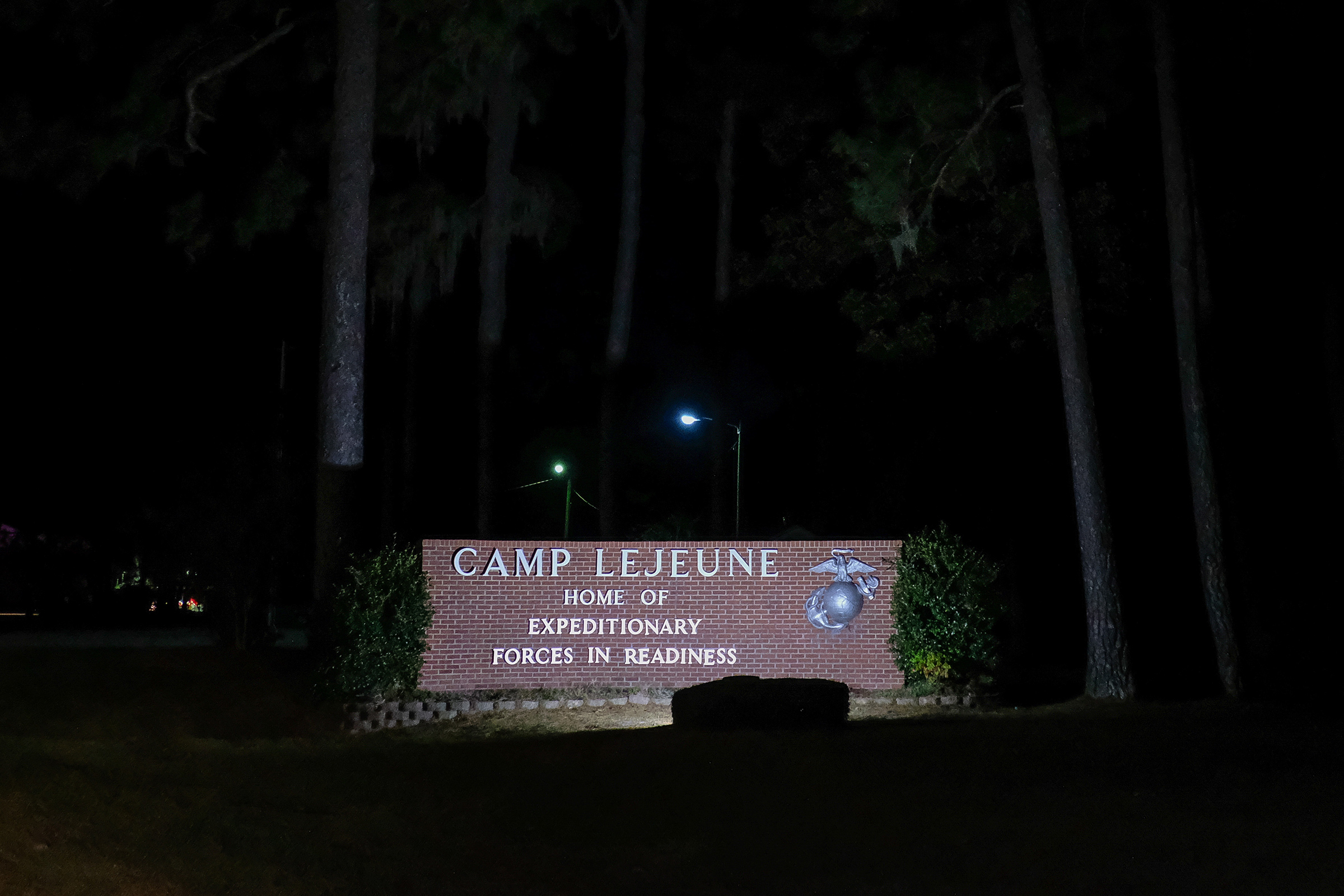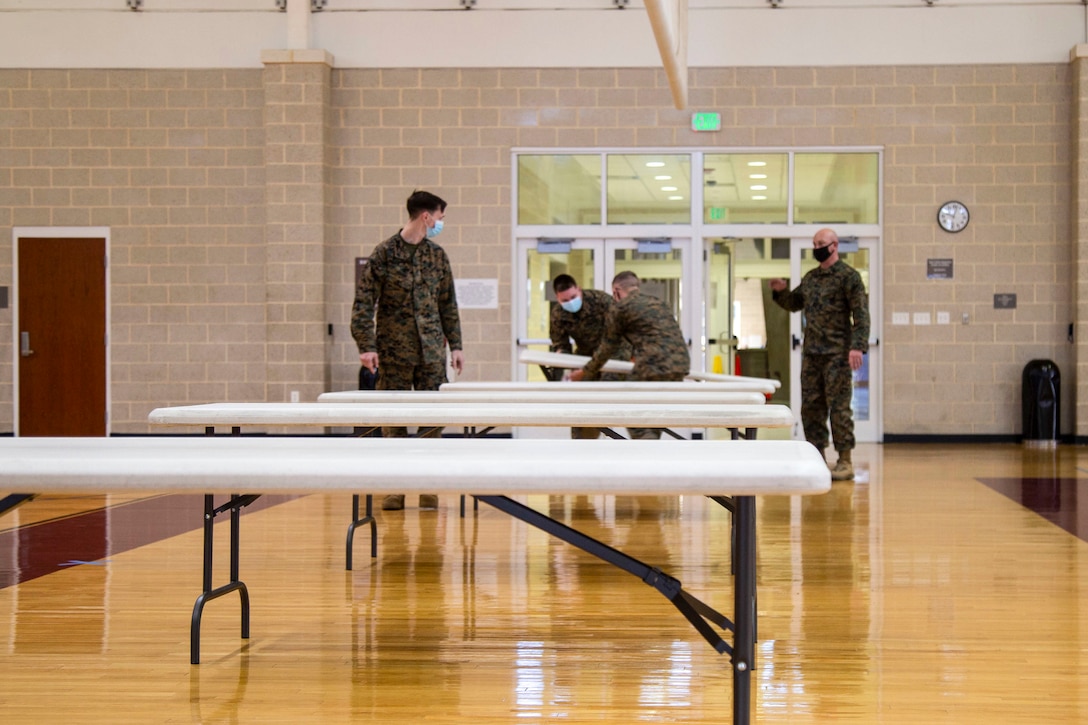Camp Lejeune Population - From the 1950s to the 1980s, people living or working in the U.S.
As part of the Caring for Camp Lejeune Families Act of 2012, eligible veterans can receive all of their health care (except dental care) from the VA if they served on active duty at Camp Lejeune for at least 30 days between Aug. 1, 1953, and Dec. 31, 1987, even if they do not have a health condition that is considered related to the exposure. For people with one of 15 medical conditions considered to be related to exposure, there is no charge for care. For other health conditions, veterans will have additional pay, depending on income and priority health eligibility category.
Camp Lejeune Population

VA has established a presumed service connection for veterans, reservists and National Guard members exposed to contaminants in the water supply at Camp Lejeune from August 1, 1953 to December 31, 1987, who later developed one of the following eight diseases:
Camp Lejeune And The U.s. Military's Polluted Legacy
Currently, these conditions are the only ones for which there is sufficient scientific and medical evidence to support the establishment of a presumption. However, VA will continue to review relevant information as it becomes available.
Veterans experiencing other health conditions they believe may be related to contaminated water at Camp Lejeune are encouraged to contact their primary care provider and file a claim. VA reviews and decides disability compensation claims on a case-by-case basis.
Under the Camp Lejeune Health Care Act of 2012, the VA provides free health care for certain conditions to veterans who served at least 30 days of active duty at Camp Lejeune between August 1, 1953 and December 31, 1987.
Veterans who qualify for health care under the Camp Lejeune Health Care Act of 2012 can enroll in VA Health Care and receive medical services for the 15 covered health conditions at no cost (including copays).
Camp Lejeune Study Finds Higher Cancer Death Risk
Not yet enrolled in VA health care? Apply online or call 1-877-222-8387 for assistance. Tell VA personnel that you served on active duty at Camp Lejeune for at least 30 days during the covered period.
Family members of veterans who also resided at Camp Lejeune during the qualifying period are eligible for reimbursement for out-of-pocket medical expenses related to the 15 covered health conditions. The VA can only pay for treatment costs that remain after your other health plans pay.
When no evidence is submitted, VA will use all relevant evidence from internal sources and the Department of Defense (DOD) to support your application. Please note that it may take longer to review your application. The main gate to Camp Lejeune Naval Base outside Jacksonville, N.C., is seen Friday, April 29, 2022. (AP Photo/Allen G. Breed) (Allen G. Breed, copyright 2022 The Associated Press. All rights reserved)

On August 8, President Joe Biden signed into law a bill that culminated months of debate and votes in Congress.
Why Has Camp Lejeune Become Such A Hot Topic Of Late?
Camp Lejeune is a US military training base located in Jacksonville, North Carolina. Located along a 14-mile stretch of beaches, it is the largest Marine Corps base on the East Coast. The base is 153,439 acres in size.
It was discovered that from 1953 to 1987, people living or working in the camp drank and bathed in water laced with toxins.
Potential victims may not receive compensation because of a statute of repose in North Carolina that bars tort claims after 10 years.
Well, the big thing it did was attract the attention of lawyers across the country, who stepped up and advertised their services.
The Effects Of Camp Lejeune Water Contamination
The law now effectively supersedes the law in North Carolina and allows those exposed to contaminated water at Camp Lejeune to seek compensation.
There are conditions, such as proving that damage is caused by at least 30 days of exposure to water.
The bill also prohibits a person who brings such an action from bringing a separate tort action against the United States based on the same damages.
But after decades of controversy surrounding Camp Lejeune, the new law gave potential victims a chance to receive compensation and became an issue for many, especially lawyers.
Home The Few, The Proud, The Forgotten Camp Lejeune Toxic Water Contamination
Keith is part of Graham Media Group's digital content team, producing content for all of the company's news sites. One of the most common questions we get from clients is how long it will take to settle a contamination case at Camp Lejeune. You've heard of massive class action tort lawsuits that take years to settle. Our lawyers believe that the process will be very different from this stereotype.
In this post, our lawyers explain how long the process is likely to take. We discuss how long it might take for your Camp Lejeune lawsuit to reach a settlement (and what the settlement payment might be).
As anyone reading this knows, Camp Lejeune is a large Marine Corps base in North Carolina that has been home and workplace to millions of Marines, families and civilian contractors over the years. Before 1988, the drinking water supply at Camp Lejeune was heavily contaminated with dangerously high levels of harmful industrial chemicals.
The chemical levels in the Lejeune water are several thousand times above the maximum safety levels set by the EPA. Residents and workers at Camp Lejeune have been drinking and bathing in carcinogenic water for decades. Not surprisingly, public health studies have found that people who worked or lived in Lejeune before 1988 had significantly higher rates of various types of cancer and other major health conditions.
County Population Estimates: Race & Ethnicity
An estimated 1 million people were exposed to the contaminated water at Camp Lejeune. Our attorneys at Camp Lejeune anticipate that between 100,000 and 200,000 water contamination lawsuits will be filed.
Previously, victims of the water contamination at Camp Lejeune could not bring civil lawsuits and receive financial compensation for their injuries. This is due to an unforgiving statute of limitations in North Carolina. But this year, Congress finally took action to address this injustice.
In August 2022, a new federal law called the Camp Lejeune Justice Act (CLJA) was enacted. The CLJA gave victims of the Camp Lejeune water contamination the right to file civil lawsuits against the government. The CLJA gives prospective plaintiffs only a limited time of 2 years to file claims.

Before a civil action can be filed in court under the CLJA, all claimants must first file an administrative claim with the Navy. These claims are very similar to administrative claims under the Federal Tort Claims Act. The CLJA administrative claim must be accepted or rejected within 6 months, after which the claimant can proceed and file their civil action in court.
John A. Lejeune Hall, Also Known As Building One, Is The Headquarters Building For Marine Corps Installations East Marine Corps Base Camp Lejeune. In August 1942, Lt. Col. William P. T. Hill Moved
All Camp Lejeune administrative claims must be submitted to the Office of Judge Advocate General (JAG) of the Navy Tort Unit (TCU) in Norfolk, VA. JAG TCU will handle the Camp Lejeune claims under the supervision of the Department of Justice.
JAG has created a special CLJA claim form to be used when filing new Camp Lejeune cases. The claim form contains the basic information that will be required of CLJA clients. There are basically 2 main things that CLJA applicants will need to prove: (1) residence or employment at Camp Lejeune, and (2) a diagnosis of an illness or medical condition that may be related to the water at Camp Lejeune.
CLJA plaintiffs will need to have some type of evidence to support both of the main elements of their case. Veterans who were stationed at Lejeune can prove residency by obtaining their Official Military Personnel File with a DD214 request. Family members of veterans who have been on base will need additional documentation to prove their relationship (eg marriage license, birth certificate, etc.).
Civilians who have worked at Camp Lejeune will need documentation of that employment. Paychecks, tax returns or a work history report from the Social Security Administration will all satisfy this.
Camp Lejeune, Cherry Point Commanders Report Success In Covid Fight
The administrative claim must be resolved before a civil action can be brought under the CLJA. However, JAG has a strict 6 month deadline to take action on the claims. The JAG must either accept or reject the claim 6 months after it is filed. If the claim is accepted, the Department of Justice, which seems to lead most of the heavy water in these cases, will offer a settlement amount to compensate the victim. The settlement offer will be the required settlement payment or less. If the claim is denied before the 6-month deadline, the claimant may immediately file a lawsuit at Camp Lejeune.
There is currently much speculation about how the JAG will handle the administrative claims process for the Camp Lejeune cases. Normally, in cases under the FTCA, the administrative claim is merely a procedural hold and the claims are either dismissed outright or allowed to expire within 6 months.
Our attorneys believe that the process can be very different for Camp Lejeune lawsuits and this will affect the time it takes to settle a Camp Lejeune lawsuit. These cases are unique because the government has

Military drone range, laser range finder military, military range bags, military range targets, long range military radio, military radio range, military range finder, military long range binoculars, range rover military discount, military range rover, range of military drones, military range bag

0 Comments